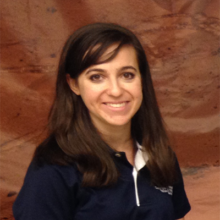PhD Candidate, Georgia Institute of Technology
Email
Abstract
Designing an In-Home Scalable Robotic Arm and Tablet Gaming Suite for Hand Function Rehabilitation for Neurological Disorders
The objective of my research is to design an innovative therapy device that customizes the learning experience for children with cerebral palsy by combining a passive robotic therapy device with an adaptive gaming suite that alters the interaction in order to best fit the needs of the user. Physical therapeutic exercises are commonly prescribed to individuals with motor disabilities with the goal of increasing proficiency of a motor skill. During the physical therapy process, individuals will usually practice once a week with the assistance of a clinician and six days a week in isolation. When practicing exercises in the presence of a skilled clinician, an individual receives several benefits including: (1) real-time feedback on accuracy of motions; (2) real-time adaptations to an exercise plan that accommodates the client’s skill level and performance; (3) social interactions that increase engagement; and (4) positive feedback that increases morale. These benefits are not realized by the client when practicing exercises in isolation, causing clients to struggle with complying with therapeutic regimens at home. This lack of support in the at-home environment often causes clients to struggle with complying with therapeutic regimens at home. To address the needs of this target demographic, our goal in creating the therapy device first involved designing a robotic exoskeleton coupled with an adaptive rehabilitation gaming suite that encourages therapeutic motions. By conducting a number of participant studies, we have been able to verify the system’s ability to encourage accurate therapeutic motions while increasing participant engagement. Our next set of goals involves implementation of a learning model and adaptive feed-back algorithms that monitors performance of the user based on a normative model of motor learning and provides customized feedback through game adaptation to ensure the user achieves their optimal performance for learning. Preliminary results have shown that we can maximize long-term performance by adapting the interaction based on current performance. The final system will be validated with children with cerebral palsy in a long-term study over the course of several months to ensure the trends that have been seen in able-bodied participants also occur in our target population group.
Bio
Brittney English is a PhD candidate in the School of Electrical and Computer Engineering at the Georgia Institute of Technology. Her research focuses on developing exoskeletons and serious games that encourage rehabilitative motions. Her primary research interest is to develop machine learning methods for classifying a user’s mastery of a task and leveraging this information to adapt the interaction parameters of a serious game in order to provide the most optimal difficulty, allowing for users to learn the task most efficiently.
Brittney received a BS in Computer Engineering from the Georgia Institute of Technology in 2011 and an MS in Electrical and Computer Engineering from the University of Florida in 2013. She has worked for the Naval Surface Warfare Center and Air Force Research Laboratories. Brittney is very involved in outreach and has mentored and been the graduate student assistant for the Opportunity Research Scholars (ORS) Program, the graduate student coordinator for the Summer Undergraduate Research in Engineering (SURE) Robotics Program, and a teacher for Women In Engineering Technology, Engineering, and Computing (TEC) camp. Brittney’s research has received many accolades, including being recognized with the NCWIT Collegiate Award Honorable Mention, RESNA Student Design Competition Finalist, and in articles including “Women in Robotics”, “Ph.D. Research Mentor Brittney English Pays It Forward”, and “Brittney English Applies Lessons from Childhood to Engineering Outreach.”
